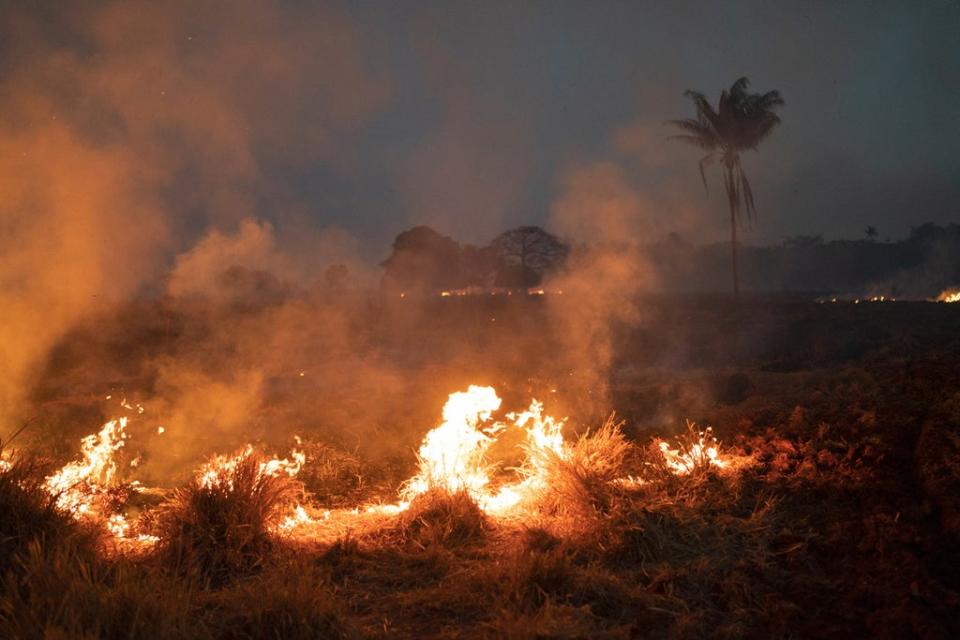Satellite images reveal accelerated rate of tree loss in Amazon this year

New evidence of accelerated forest loss in the Brazilian Amazon has emerged just weeks after the country joined a Cop26 pledge to reverse deforestation by 2030.
Satellite images – taken on 3 October, 2021 – show vast, clear-cut tracts when compared with images from October 2020. The images, of forested areas near Castelo de Sonhos in the northern Brazilian state of Para, were acquired by the European Union’s Copernicus Sentinel-2 satellites.
The Amazon rainforest is one of the planet’s richest areas of biodiversity. Trees, especially in old-growth forests which have been standing for millennia, store carbon and are among our best natural allies in slowing the pace of human-caused climate change.
An estimated 13,235 square kilometres of Amazon rainforest have been lost in 2020-21, according to data from Brazil’s National Institute of Space Research (INPE) – a 22 per cent increase in deforestation over one year, and the highest level in more than 15 years.
At the Cop26 climate summit earlier this month, more than 100 national leaders – including Brazilian President Jair Bolsonaro – promised to reverse global forest loss by the end of the decade.

The agreement covered 85 per cent of the planet’s forests including the tropical rainforests of Brazil, Colombia, Indonesia and the Democratic Republic of the Congo – an area of more than 13 million square miles.
The pledge was backed by $12billion (£8.75bn) of public funding from governments, with a further $7.2bn (£5.3bn) from private investment.
The commitment was cautiously welcomed by environmental groups which also warned that immediate action was needed to stop new logging.
Greenpeace was critical of the lack of a binding timetable for the measures – saying the announcement amounted to a “green light for another decade of forest destruction”.
“There’s a very good reason [President] Jair Bolsonaro felt comfortable signing on to this new deal. It allows another decade of forest destruction and isn’t binding,” said Carolina Pasquali, executive director of Greenpeace Brazil.
Indigenous peoples have called for 80 per cent of the Amazon to be protected by 2025 as it teeters in a perilous state.
A study in May found that the Amazon, where dense rainforest was long believed to be absorbing planet-heating pollution, is instead emitting close to one-fifth more carbon dioxide (CO2) into the atmosphere than it has stored.
Between 2010 and 2019, the Amazon released 16.6billion tonnes of CO2, while sucking up 13.9bn tonnes.
“We half-expected it, but it is the first time that we have figures showing that the Brazilian Amazon has flipped, and is now a net emitter,” the study’s co-author Jean-Pierre Wigneron, a scientist at France’s National Institute for Agronomic Research (INRA), told AFP.
“We don’t know at what point the changeover could become irreversible.”
While forests can act as carbon sinks, the reverse is also true: when they burn, more carbon emissions are spewed into the atmosphere. The Amazon suffered the worst blazes in a decade last year.
The destruction of the Amazon rainforest has proliferated under Mr Bolsonaro, a right-wing populist whose government has weakened environmental protections and bolstered mining, cattle-ranching and logging.
Mr Bolsonaro has frequently played down that the Amazon is burning, calling his own government’s evidence of thousands of wildfires a “lie”.
Read More
Albatross ‘divorce’ rates up due to climate change, study finds
British people more concerned about climate change than the pandemic, poll shows
Police urge people ‘inconvenienced’ by Insulate Britain protests to come forward
Albatross ‘divorce’ rates up due to climate change, study finds
British people more concerned about climate change than the pandemic, poll shows
Police urge people ‘inconvenienced’ by Insulate Britain protests to come forward

 Yahoo News
Yahoo News 
